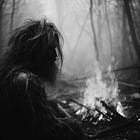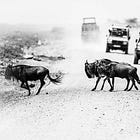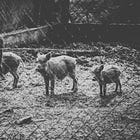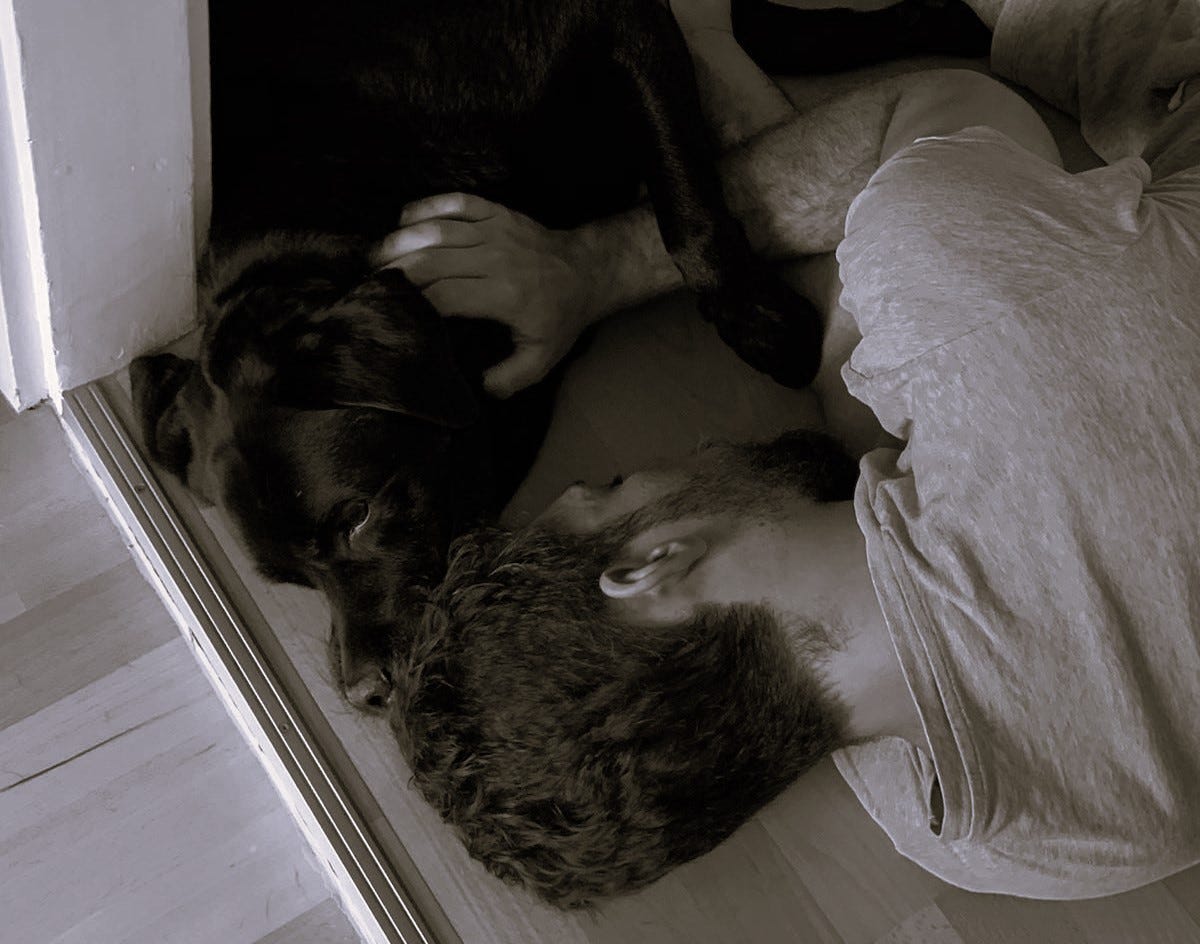Not of the natural world
Humanity’s lasting separation from its surroundings, and the catastrophic subjugation of all that lives.
A few days ago, my best friend died:
Leo had been with me through the hardest times, through the best times, everything. He was always there for me, never judging, always comforting, communicating in his own ways. He was conscious; very much so. He had desires and dislikes and memories, good and bad, same as every person on this earth. I loved him, and still do. I will remember him, always. He was thirteen years old when he died. Still, I’m grieving.
Where do we draw the line?
Leo was special to me. My best friend. From a morality standpoint, I could not — and would not — place him below just any human by default. Does that make me immoral?
If I were to either save a stranger person or Leo from a fire, I would, in all likelihood, save Leo.
Why does this induce rage in so many people?
Where does this self-aggrandizement of all humanity come from? Why do we see ourselves as apart from the rest of the natural world, special, chosen by God, whatever, when it is so obvious that, on average, we are brutal animals, cruel and power-hungry?
Look at all the wars over nothing, look at children dying, their mutilated corpses littering the Gaza strip right fucking now; look at all the suffering, and the cruelty, and that ever-present desire to overpower others. The utter stupidity and ignorance, the empty consumerism, all the hate and the greed. The annihilation of the most beautiful planet we know of; the only one that is alive. The industrial slaughterhouses of this world, where we kill billions every day just so we can keep multiplying and growing and spreading, to who-knows-where, for who-knows-what reason.
Lords and ladies of the earth
In The Dawn of Everything David Graeber and David Wengrow provide a detailed and convincing account of humanity’s lasting spiritual and physical separation from the rest of the natural world. For our purposes here, I will completely butcher their analysis:
In short: early human societies, whatever else you may think of them, in general, did not view themselves as distinct or separate from nature; instead, they built intricate belief systems, practices, and rituals that acknowledged their interconnectedness with the natural world. They were just one species among many, trying to survive, same as everything else:
With the rise of complexity came the domination and subjugation of animals and nature in general. Various historical and cultural forces such as institutionalized religions, particularly the Catholic Church, humanism, and the Enlightenment then fostered and solidified the notion of human exceptionalism, providing convincing excuses for domination and cruelty — the biblical notion that it is humanity’s destiny to rule and ‘improve’ the world and that all else in existence is there to serve man (and woman, to a lesser degree).
This worldview, born perhaps — and this is my theory — of the increasing cognitive dissonance between the cruelty of industrial agriculture and domestication and the benevolent values religions and cultural institutions pretended to propagate, directly led to slaughterhouses, pollution, and the global climate breakdown we live today. We had the choice between egotistic comfort and morality, and so we chose to destroy the world so there could be more of us and we could live longer. This imperialist conquest of nature, eventually, proved but a small leap toward the imperialist conquest of peoples of other skin colors, beliefs, whatever else perceived difference:
This phenomenon, influenced in North America mostly by Puritan values, is a relatively recent one. It is also the first (and largest) unsustainable doctrine in human history. Capitalism — which is what it culminated into — for better or worse, will not last much longer. Homo sapiens has spent almost all of its existence in struggle and harmony with nature, in freedom; the current separation is but a blip in history.
Faceless brutality
Let us regard this graph. Let us ponder it for a moment. Just think:
Now, tell me, how many of us would slaughter a cow or a sheep with our own hands? Could you do it? Would you do it?
When I told my family and closest friends of Leo’s death and my grief they were compassionate and kind, yes, but few could understand or relate to my emotions. It was just a dog, after all. Sadness, yes, but truly grieving? — that is reserved for humans. To be brutally honest, I did not much grieve my grandparents’ deaths a couple of months ago (they died two weeks apart). I had not much to do with them, and rarely saw them. Rather, I grieved for my mother’s grief. But this one… Leo’s death made me inconsolable for days.
Is it socially acceptable to admit such a thing? — Fuck, no.
Humans and the rest, a lasting duality.
I often expressed the opinion that how we treat animals today (except some chosen species we call ‘pets’) and what we do to them, will one happy day be regarded as inhuman barbarism — one of the greatest crimes of our species. That is if we are still around then.
Until death do us part
I held Leo’s paw in the last moments of his life. It was the hardest I ever had to do. He looked into my eyes, and I saw that he understood. He was glad I was there for him, and I was so very glad for everything he had done for me. Afterward, I carried his limp body to the car, and then we buried him with his favorite toy.
He was put to sleep, forever, in a quick and peaceful manner. One small injection and he was gone in a matter of a minute. I was glad there was no pain. He had lived a full and happy life. It was time for him to go, and he knew it.
Now, contrast that to what we do to ourselves. All the treatments, life-prolonging measures, all the pain we suffer just so we can live longer, always in the belief that quantity somehow equals quality. So very, very terrified of death and nothingness that we would raze a planet, kill all there is to kill, just to avoid the void. We put our parents and grandparents into homes and camps, so they can vegetate longer, all life so very sacred except when it’s foreign or not quite human. We are a species that can accept genocides and wars around the world, but not the death of our loved ones. Yet death is nature, and nature is death. It’s as natural as living, but we have forgotten how to do that, too.
You will be with me, always.
If you want to support my work, you can do so by subscribing here on Substack:
You can also support my pursuit of freedom on Patreon (starting at $2 a month) or leave a tip and some coffee money on PayPal. Capitalist means to escape capitalism, sure. What else is there?
Anyway, thanks for reading.










Writing here on Substack has always been kind of therapeutic for me, I hope you don't mind. Anyway, hug your animal friends. They are precious and their lives always too short ♥️
Thank you Antonio🙏I see civilization as a sickness and, unfortunately, most humans living a ”civilized life”, probably I as well, are just sick ”cells” living and manifesting the sickness that is our way of living. Our civilization is a one form of cancer and all our ”progressive” persuits are just a manifestation of sickness. We have looked down on indigineous cultures because they have not ”progressed” and ”invented” the things we have. As sickness we have not understood that they have not done these things because they are healty, they know how healty beings live and they live in a healty way with everything, they see no sense in our pursuits, because no healthy being lives like that. We are manifesting sickness and we live in a sick way with everything. Pursuing endless growth is the logic of cancerous sickness and we are manifesting it in a global scale with our cancerous growths (called urban environment).